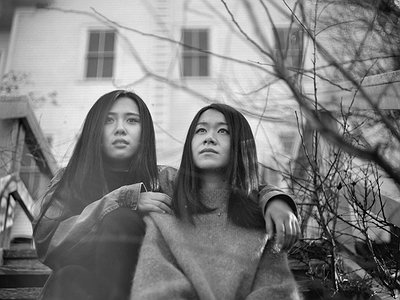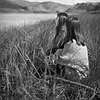Names: Sophia Shen / Lemon Guo
Nationality: Chinese
Occupation: Musician
Current Release: 42 Days self-released on Bandcamp
Recommendations: Ne Nehledej by Iva Bittová / Ping Tan by Wu Fei, Helge A. Norbakken, Carla Kihlstedt and Fred Frith
Listen and buy music from Southeast of Rain on www.southeastofrain.com
When did you start writing/producing music - and what or who were your early passions and influences? What was it about music and/or sound that drew you to it?
Lemon: 8 years ago, Sophia and I went to Alaska with the EcoSono Institute. We learned to work with different types of field recording gear and recorded incredible sounds such as humpback whale bubble-net feeding, midnight bird chorus and glaciers melting. One day we were recording the Holgate Glacier, a huge chunk of iceberg broke off the glacier right in front of our little boat. The sound was earth-shattering and it made climate change feel very real and physical. It was a formative experience for us as a duo.
For most artists, originality is preceded by a phase of learning and, often, emulating others. What was this like for you: How would you describe your own development as an artist and the transition towards your own voice?
Sophia: We’re still looking for our own voices, individually and collectively. Over the years we have learned a lot from all forms of interdisciplinary collaborations, including working with dancers, directors, visual artists on other media. It’s exciting and artistically stimulating.
Lemon: Pipa and voice are a combination that hasn’t been explored a lot before, and we had no direct precedent to follow, which motivates us to listen closely to each other and develop our own sound. We have also been mixing and mastering all our music by ourselves. It is part of our ongoing experiment in creating our own sound. Our debut album 42 Days shows our effort in creating a new musical form that combines pipa, voice and field recordings.
How do you feel your sense of identity influences your creativity?
Lemon: 80% or 90% of my collaborators have been women in the last five years. It wasn't intentional, but it was awesome. They have been so brilliant and supportive. As a woman who works with audio technology, I didn’t have to fight to prove my technical capability to them the same way I often had to with men. In the past, I've had multiple experiences where I had to yell the same thing three times to some guys in the studio just to get my point across. It was truly humiliating and exhausting. It felt so much nicer to create in a nurturing environment, not having to be on the defensive constantly. Of course there are men I love working with, and all of them share the collaborative qualities of these women too. Unfortunately this male-dominated field isn’t so nice most of the time.
The cultural identity often comes out in our improvisations. In the piece “Day 25: Traveler” from 42 Days, I sang five improvised layers, each time responding to the previous layers. And in that space I moved through different musical influences that had left a mark on my voice throughout the years, from Chinese folk music to Bulgarian choral music and more.
What were your main creative challenges in the beginning and how have they changed over time?
Lemon: During college, I really wanted to have a band. But as a young Chinese woman who had just moved to Virginia, the music I grew up listening to was really different from that of most people around me, so I didn’t quite fit in. At the same time, I was taking some computer music classes and learned to record and compose music in Logic Pro when I realized that I could layer my voice, manipulate it with electronics and have my own “band”! So I did that for a while. Luckily I gradually found many wonderful collaborators over the years, but then Covid happened. So I am now back to doing a lot of recording and editing on my laptop in my bedroom again.
As creative goals and technical abilities change, so does the need for different tools of expression, be it instruments, software tools or recording equipment. Can you describe this path for you, starting from your first studio/first instrument? What motivated some of the choices you made in terms of instruments/tools/equipment over the years?
Sophia: I started learning piano when I was 4, and later when I was around 10 years old, I wanted to play a Chinese instrument, so I picked pipa - little did I know that it was such a difficult instrument to play. In college I really wanted to learn music technology, but at first it was so hard for me to get used to sitting in front of a computer instead of an instrument, being a performer my whole life. But then I thought of technology as an addition to my palette. Maybe it isn’t so bad to have more than one color to be expressive.
Have there been technologies or instruments which have profoundly changed or even questioned the way you make music?
Sophia: Some of my friends and mentors are instrument builders living in the Bay Area and it’s a truly eye-opening experience to visit their home woodshops and play on those unique instruments nobody has ever seen before. Learning about instruments from other cultures inspires me tremendously. So many wonderful sounds in the world and a lot of people don’t even know their existence.
Collaborations can take on many forms. What role do they play in your approach and what are your preferred ways of engaging with other creatives through, for example, file sharing, jamming or just talking about ideas?
Lemon: Sophia and I have known each other for almost 10 years now, and the way we collaborate keeps changing. We used to run the Chinese Music Ensemble together at the University of Virginia. Sophia was in charge of the instrumental section, and me the choral stuff. After moving to separate coasts, we kept a shared playlist to keep each other updated on our current interests. When editing 42 Days a few months ago, I (proudly) coerced Sophia to adopt my project naming system because we were sending a ridiculous amount of files back and forth every day and it was getting difficult to keep track. We also text a lot. Lots of “don’t know what to eat for dinner”, “the reverb on pipa should be a notch lower”, and the “happy puppy getting a haircut“ video when we were finally satisfied with the result of certain 10-second sound we spent three days mixing LOL.



